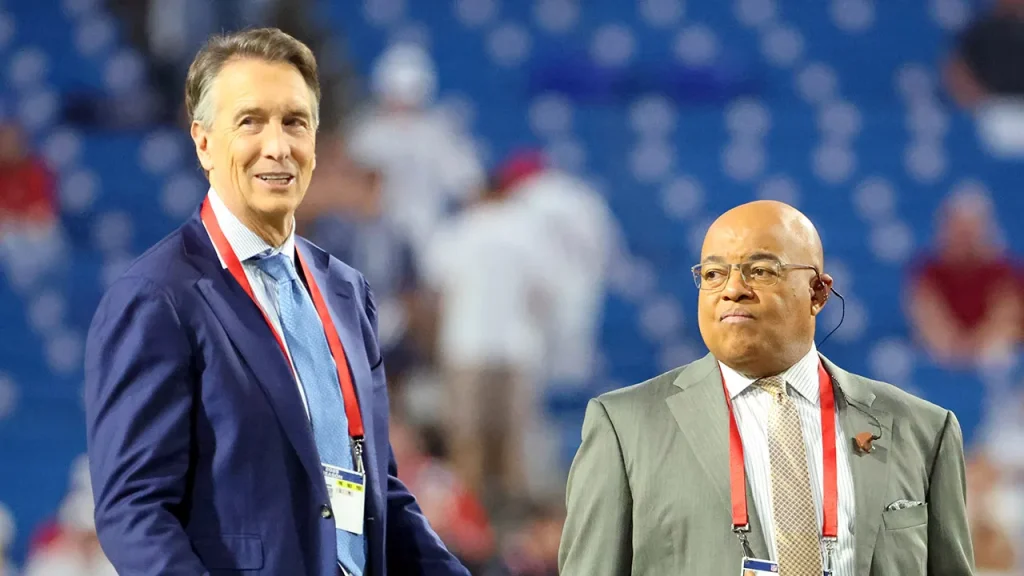NFL Broadcast Humor Amid Political Tensions
In a moment of subtle political commentary during Sunday night’s NFL broadcast, former Cincinnati Bengals star and NBC announcer Cris Collinsworth slipped in a joke about the ongoing government shutdown. As the broadcast showed an image of the U.S. Capitol between the third and fourth quarters of the Seattle Seahawks’ decisive victory over the Washington Commanders, Collinsworth quipped, “There’s a calm place,” drawing a knowing chuckle from his broadcast partner Mike Tirico. The lighthearted moment came as a brief respite during a game that was already well in hand for Seattle, but it highlighted the unusual intersection of sports entertainment and the political reality affecting millions of Americans as the government shutdown enters its sixth week.
The timing of Collinsworth’s comment reflects a broader tension in American society, where even sports broadcasts—traditionally seen as escapes from political discourse—can’t fully separate themselves from the nation’s political climate. President Donald Trump recently expressed confidence in an interview with “60 Minutes” that Democrats would eventually yield to Republican demands, stating “I think they have to,” despite the fact that negotiations between the parties have stalled completely. This ongoing political impasse forms the backdrop against which Americans continue their daily lives, including watching Sunday Night Football—a cultural institution that brings together viewers of all political persuasions in a shared national pastime, even as the machinery of government remains frozen.
On the field, the Seahawks were crafting their own narrative of dominance behind quarterback Sam Darnold, who put on a clinic of precision passing. Darnold began the game with an extraordinary streak of 17 consecutive completions, not throwing his first incompletion until the third quarter. His performance in the first half was particularly impressive, as he connected for four touchdown passes—finding Tory Horton twice and delivering one score each to Cody White and Elijah Arroyo. This offensive explosion helped Seattle build a commanding 28-point advantage before halftime, essentially putting the game out of reach for Washington. By game’s end, Darnold had completed 21 of 24 passes for 330 yards, with his only blemish being a second-half interception that came long after the outcome had been decided.
While Seattle’s offense was firing on all cylinders, the Commanders faced a significant setback when their rookie quarterback Jayden Daniels exited the game with what appeared to be a serious arm injury. Before his departure, Daniels had completed 16 of 22 passes for 153 yards, though he had thrown an interception. He did manage to score on the ground, as did running back Chris Rodriguez, providing Washington’s only highlights in an otherwise forgettable performance. The injury to Daniels represents a potential turning point in the Commanders’ season, as the rookie had been showing promise in the early stages of his NFL career. For Seattle, tight end A.J. Barner contributed to the scoring with a rushing touchdown, while receiver Jaxson Smith-Njiba led the team’s aerial attack with eight receptions for 129 yards, demonstrating the depth and versatility of the Seahawks’ offensive weapons.
The contrasting fortunes of these two teams reflects the unpredictable nature of the NFL season as it approaches its midway point. Seattle improved to 5-2, positioning themselves as legitimate contenders in the highly competitive NFC West division. Their comprehensive victory on Sunday night showcased a well-balanced team capable of dominating on both sides of the ball. The Commanders, meanwhile, fell to 3-5, with their playoff hopes dimming and questions emerging about how they’ll navigate the remainder of their schedule if Daniels’ injury proves serious. This game represented not just a victory for Seattle but potentially a pivotal moment in both teams’ seasons—one continuing an upward trajectory, the other facing increased uncertainty.
In the broader context of American culture, Sunday’s game provided a familiar comfort to millions of viewers seeking entertainment amid political uncertainty. The juxtaposition of Collinsworth’s offhand comment about the Capitol with the athletic spectacle unfolding on the field serves as a reminder of sports’ unique place in American society—simultaneously separate from and intertwined with the political realities that shape our daily lives. As fans returned to work Monday morning, they carried with them not only memories of Darnold’s precision passing and Seattle’s dominant performance but also a subtle reminder that even as government functions remain paused, the cultural institutions that unite Americans across political divides continue unabated, offering moments of shared experience in a time of national division.


